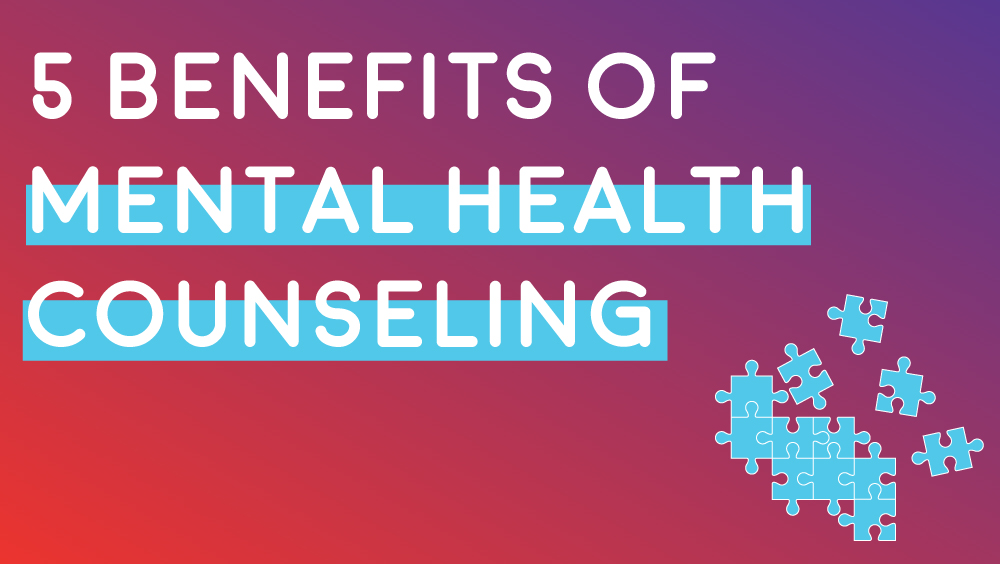Rumored Buzz on Mental Health Counseling
Rumored Buzz on Mental Health Counseling
Blog Article
More About Mental Health Counseling
Table of ContentsThe Facts About Mental Health Counseling UncoveredThe 4-Minute Rule for Mental Health CounselingThe Buzz on Mental Health CounselingOur Mental Health Counseling StatementsThe 2-Minute Rule for Mental Health Counseling
With therapy, you can obtain insight right into your very own patterns of habits and communication, which can lead to more meeting and satisfying relationships with pals, family, and charming partners. What we assume, we materialize. If you're taken in with negative feelings and adverse ideas that are conflicting with your life, therapy can help., or there are various other adverse means you behave. Therapy can help you change those habits that are having an unfavorable influence on your globe and partnerships.

Getting therapy to address particular elements of your life can assist you be extra effective in other locations, consisting of work.
4 Easy Facts About Mental Health Counseling Shown
You can see a specialist when things are going really well in your life, or when you're concerning to go with a large life shift." Talkspace specialist Kate Rosenblatt, MA, LPC, LMHC. There are also much more advantages of therapy than just the ones we have actually gone over. Treatment can show you how to manage divorce, take care of sorrow, or construct connections (romantic or those with friend or family) in a healthy way.
For the objective of the here and now research, regarded advantages and obstacles to mental health and wellness help-seeking are being checked out. Previous research study found that perceived barriers have a considerable effect on university student' wellness actions options (Von Ah, Ebert, Ngamvitroj, Park & Kang, 2003). Viewed benefits and obstacles to help-seeking were especially chosen because of their influence on decision-making and ultimately activity (Glanz, Rimer, & Su, 2005).
The existing study looks for to analyze whether or not preconception offers as a barrier to treatment amongst college trainees. Amongst these were: (1) choosing to deal with psychological wellness problems themselves, (2) not having adequate time to participate in treatment, (3) concerns concerning whether mental health treatment is reliable in remediating troubles, (4) a belief that tension is typical or the issue will certainly obtain better without treatment, (5) absence of cash, and (6) worry about what others would believe if they discovered out concerning treatment participation.
(2006) reported comparable variables as obstacles to looking for therapy and additionally found that a skepticism of carriers may hinder students from seeking help. Team in campus mental health centers may be perceived as hostile, and long wait times for solutions may be "off-putting" for trainees. Variables helping with much more positive attitudes are frequently at the opposite pole of those variables recognized as obstacles.
An Unbiased View of Mental Health Counseling
One in three (34.6%) reported residing on campus and one in 4 (23.3%) reported coping with parents. Virtually half of trainees were involved in school companies and 1 in 10 reported being in a fraternity or sorority. Greater than one-third of students (38.1%) reported that they had a member of the family or good friend with a diagnosed mental wellness disorder.

The Basic Principles Of Mental Health Counseling
Univariate F-tests recognized certain subscale products that considerably varied. Women were less most likely than males to regard individuals who most likely to counseling as emotionally weak, individuals who go to therapy as crazy, to really feel that people with mental health issue should take care of issues on their own, that people who most likely to counseling as unable to fix problems, that people who most likely to counseling slouch, and to feel that people that most likely to therapy are different from regular people in an adverse way.
Research study results exposed that women were dramatically less likely than males to hold stigma-related attitudes. This follows previous research which likewise discovered that males hold higher levels of viewed stigma than women (Chandra & Minkovitz, 2006). Based on research study findings, it is evident that men might be much less likely than women to seek treatment due to low regarded obstacles as well as high stigma-related mindsets.
Mental Health Counseling for Dummies
On top of that, university health specialists may offer curricula targeting males with details on the benefits of psychological health treatment and the relevance of seeking assistance when needed. All methods pop over here ought to be assessed with future research study to figure out the effect on university student, specifically males. Unlike basic population studies which disclose that women are much more most likely to look for out mental health and wellness solutions compared to men (Haunstein et al., 2006; Mackenzie, Gekoski, & Knox, 2006), the present research discovered no substantial differences in the variety of perceived obstacles to help-seeking behaviors based on sex.
Scientist hypothesize that this is largely due to conventional social standards and gender duties that characterized males based upon toughness and absence of emotional expression (Addis & Mahalik, 2003; Ang, Lim, Tan, & Yau, 2004; Mojtabai, 2007). Overall, there have actually been blended results among the university trainee population regarding sex differences (Rosenthal & Wilson, 2008). This finding was unexpected and could highlight that those who had obtained therapy had a far better concept of delay times and other "gain access to" barriers that may web link make it difficult to start therapy. Maybe, participants who have obtained therapy view much more barriers than individuals who have not obtained therapy considering that seeking counseling solutions once again could involve anxiety of self-disclosing individual info click over here now to a new therapist.
Report this page